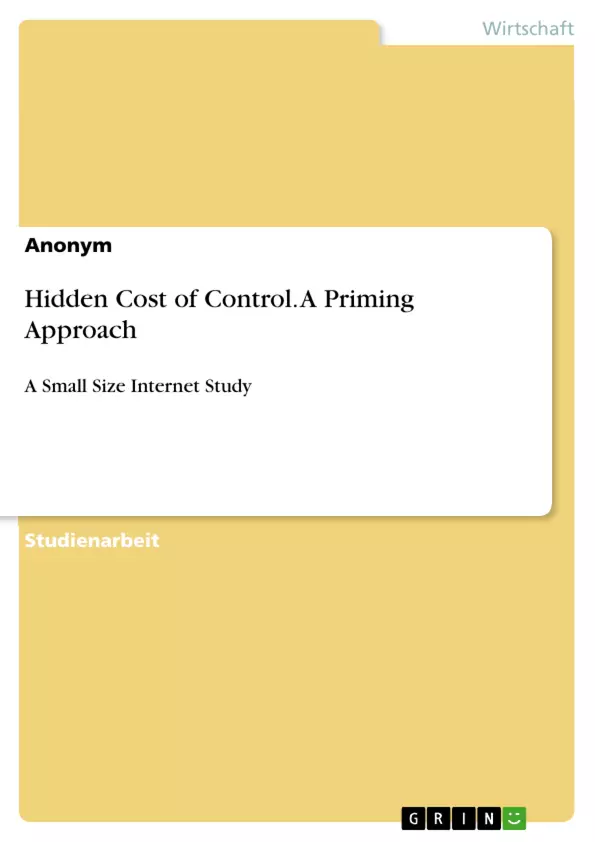We argue in this paper that priming has an effect on hidden costs of control in a principal-agent relation by influencing the crowding out or crowding in of the agent's non-monetary motivation. This means we expect that the higher or lower intrinsic motivation through the priming has an effect on agents effort compared to the control group. Moreover, we expect higher hidden cost of control in the negative priming treatment, respectively lower in the positive priming treatment since we expect our priming to affect the control aversion of our agents.
If we assume that that people already have a control aversion without priming as shown by Falk and Kosfeld (2006) or by Schmelz and Ziegelmeyer (2015), we expect the increase in the hidden costs of control in the negative priming treatment to be larger than the decrease in the positive priming treatment, because we expect higher consistency of our priming text with their initial beliefs.
Our paper offers a contribution to the literature on incomplete contracts and builds on the results of Falk and Kosfeld (2006), Ziegelmeyer et al. (2012) and Schmelz and Ziegelmeyer (2015) to investigate the robustness of hidden cost of control to design variation. We extend their research by analyzing how intrinsic motivation and control aversion can be influenced by the use of priming.
Furthermore, we extend the literature which analyses whether priming alters individual's decisions when there are monetary incentives. While research is done about priming in economic experiments in a public good game by Drouvelis et al. (2015), in a trust game by Posten et al. (2014) or Al-Ubaydli et al. (2013) or in a bargaining game by Burnham et al. (2000), to give some examples, we extend this field of research by a priming experiment in a principal-agent game.
Summarized our study is able to replicate the results of Falk and Kosfeld (2006) in a small sized internet experiment and are additionally in line with the results of Schmelz and Ziegelmeyer (2015). Our results show hidden costs of control in an abstract internet setting. We find that agents can be intrinsically motivated and that control is crowding-out intrinsic motivation. Moreover, agents show aversion to control. Since agents show heterogeneity, these results only account for some types of agents. Furthermore, we show that principals anticipated the agents’ behavior and acted rationally given their beliefs.
Inhaltsverzeichnis
- 1 Introduction
- 2 Experimental Design
- 2.1 The Principal-Agent Game
- 2.2 Priming
- 2.3 Procedural Details
- 3 Behavioral Predictions
- 4 Results
- 4.1 Agents' Behavior
- 4.2 Principals Behavior
- 4.3 Agents' motives
- 5 Data Quality
- 6 Conclusion
Zielsetzung und Themenschwerpunkte
Diese Studie untersucht die Auswirkungen von semantischer Priming auf die "hidden costs of control" in einem Principal-Agent-Spiel. Ziel ist es, zu analysieren, wie die intrinsische Motivation und die Kontrollabneigung von Agenten durch Priming beeinflusst werden können.
- Analyse der "hidden costs of control" in einem Principal-Agent-Spiel
- Untersuchung des Einflusses von Priming auf die intrinsische Motivation von Agenten
- Bewertung der Auswirkungen von Priming auf die Kontrollabneigung von Agenten
- Reproduktion der Ergebnisse von Falk und Kosfeld (2006) in einem kleinen Internet-Experiment
- Validierung der Ergebnisse von Schmelz und Ziegelmeyer (2015) in einem Online-Umfeld
Zusammenfassung der Kapitel
Kapitel 1: Introduction
Die Einleitung stellt das Konzept der Principal-Agent-Beziehungen vor und erläutert die "hidden costs of control", die durch die Reaktion des Agenten auf die Kontrolle des Principals entstehen. Sie diskutiert die beiden gegensätzlichen Effekte von Kontrolle auf die Entscheidungen des Agenten, den Disziplinierungseffekt und den Crowding-out-Effekt. Die Einleitung führt auch das Forschungsprojekt und seine Relevanz für reale wirtschaftliche Fragestellungen ein.
Kapitel 2: Experimental Design
Dieses Kapitel beschreibt das Design des experimentellen Spiels, das auf dem Principal-Agent-Spiel von Falk und Kosfeld (2006) basiert. Es erklärt das Spiel in detaillierter Form und erläutert die verschiedenen Priming-Gruppen, die in der Studie verwendet wurden. Es werden auch die methodischen Details des Experiments, wie z. B. die Rekrutierung der Teilnehmer und die Durchführung des Experiments, beschrieben.
Kapitel 3: Behavioral Predictions
Dieses Kapitel präsentiert die verhaltensökonomischen Vorhersagen des Experiments. Es wird erwartet, dass Priming einen Einfluss auf die "hidden costs of control" in einer Principal-Agent-Beziehung hat, indem es die intrinsische Motivation des Agenten beeinflusst. Es wird angenommen, dass eine positive Priming eine höhere intrinsische Motivation und niedrigere "hidden costs of control" bewirken wird, während eine negative Priming den gegenteiligen Effekt haben wird.
Kapitel 4: Results
Dieses Kapitel präsentiert die Ergebnisse des Experiments und analysiert das Verhalten der Agenten und der Principals. Es wird untersucht, ob die Ergebnisse die erwarteten Effekte von Priming zeigen und ob die Studie die Ergebnisse von Falk und Kosfeld (2006) replizieren kann.
Schlüsselwörter
Die wichtigsten Schlüsselwörter und Fokusthemen der Studie sind: Principal-Agent-Spiel, "hidden costs of control", intrinsische Motivation, Kontrollabneigung, Priming, Crowding-out-Effekt, Disziplinierungseffekt, Internet-Experiment, Verhaltensökonomie.
Häufig gestellte Fragen
Was sind „hidden costs of control“?
Dies bezeichnet den Effekt, dass Kontrolle durch einen Vorgesetzten (Principal) die intrinsische Motivation des Mitarbeiters (Agent) verringern kann, was zu geringerer Leistung führt.
Was ist das Ziel der Priming-Studie?
Die Studie untersucht, ob semantisches Priming (positive oder negative Beeinflussung durch Texte) die Kontrollabneigung und die intrinsische Motivation von Agenten verändern kann.
Wie wirkt sich negatives Priming aus?
Es wird erwartet, dass negatives Priming die Kontrollabneigung verstärkt und somit die „hidden costs of control“ im Vergleich zur Kontrollgruppe erhöht.
Konnte die Studie klassische Ergebnisse replizieren?
Ja, die Ergebnisse bestätigen die Befunde von Falk und Kosfeld (2006) und zeigen auch in einem Internet-Experiment, dass Kontrolle intrinsische Motivation verdrängen kann (Crowding-out).
Handeln Principals in dem Spiel rational?
Die Ergebnisse zeigen, dass Principals das Verhalten der Agenten oft korrekt antizipieren und basierend auf ihren Erwartungen rational entscheiden.
Was ist der „Crowding-out-Effekt“?
Es ist die Verdrängung von innerem Antrieb (Motivation) durch äußere Faktoren wie Überwachung oder monetäre Anreize, was die Gesamtanstrengung senken kann.
- Arbeit zitieren
- Anonym (Autor:in), 2016, Hidden Cost of Control. A Priming Approach, München, GRIN Verlag, https://www.grin.com/document/354661



